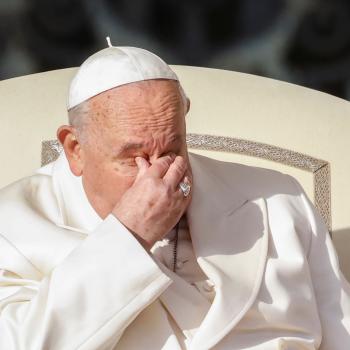Note: This article is the second of a three-part series on the Revised Common Lectionary's use of the Gospel of John during Lent. Read the first part here.
Lent 4: John 3:15-23 - God's Heart, and Ours, Laid Bare
The three most important words in real estate? Location, location, location. The same might be said of reading the Bible. When we first encounter this passage, it may be difficult to hear anything other than "the world's favorite Bible verse," John 3:16. But before tuning out the rest of the passage, it's critical to remember the location of this verse. Jesus is in conversation with Nicodemus, a teacher and leader of the Jewish religious authorities whose heart has been strangely warmed by the teaching of this young rabbi and so has come out at night to meet him.
But the conversation isn't going quite as Nicodemus planned. Misunderstanding Jesus by taking a metaphor about being born again literally (sound familiar?), he is now struggling just to keep up with Jesus: "How can this be?" (3:9). As if only to make matters worse, Jesus then starts referencing the snakebites and miraculous cures as told in the book of Numbers, the book that describes part of Israel's forty years of wondering in the wilderness. Except he's not talking about snakes, or even Israel's history at all, not really. He's talking about himself, about how he will be "lifted up" on a pole in the wilderness of the garbage heap just outside of Jerusalem and all who look to him in faith will be saved.
And then it comes, the heart of not just this scene or even John's Gospel but the whole Christian faith, John 3:16: "For God so loved the world that he gave his only Son, so that everyone who believes in him may not perish but may have eternal life."
This verse is so important because it reveals the heart of God. God is unrelentingly, even inexplicably, for us. That gets drawn out particularly in John's use of the word kosmos (that we translate "world"). Everywhere else in John's Gospel, kosmos refers to an entity that is at enmity with God. For instance, in John 17: "I have given them your word, and the world has hated them because they do not belong to the world, just as I do not belong to the world. I am not asking you to take them out of the world, but I ask you to protect them from the evil one. They do not belong to the world, just as I do not belong to the world" (14-16). So we might translate this verse both more freely and accurately by saying, "For God so loved the God-hating world...."
Everything that God does, Jesus confesses, from the sometimes confusing dealings with Israel up until and through our own day and age is done from love, just love.
But the passage doesn't stop with God, it moves on to us: "Those who believe in him are not condemned; but those who do not believe are condemned already, because they have not believed in the name of the only Son of God. And this is the judgment, that the light has come into the world, and people loved darkness rather than light because their deeds were evil."
It's an interesting take on judgment, isn't it? Judgment, at least in this passage, isn't something God actively undertakes but rather is a passive response to our broken human condition. It's as if the very presence of Christ—the one perfect human—drives us to a crisis where we either turn to follow the way of God or flee God's light and hide.
But why do we flee? Who wouldn't want to receive the loving God Jesus describes? One simple reason: unconditional love is terrifying. Sure, we think we want it, but truth be told, it terrifies us. Why? Because we are utterly powerless in the face of unconditional love. If God's great love for the world and us was conditional, you see, then we would have tremendous power. We could negotiate. We could threaten to reject God's love. We could even tell God to take a hike if we don't care for God's terms. But when God just loves us—completely and unconditionally—and when God just goes and dies for us, well then the jig is up: there's just nothing we can do to influence God.
God in Jesus has made God's decision...and it is for us. Yes, we can run. But we can't change the fact that God loves us, that God in fact loves the whole world more than we can imagine. Yes, this is good news. The best news, but first it's hard. Hard because we're not in control. Hard because it's not up to us. Hard because every time we hear how much God loves us we also know that we had nothing to do with it, cannot influence it, and therefore are out of control. At the same time, precisely because we are not in control of this relationship—that is, this is a relationship established wholly by God—we realize it is the one relationship we can't blow. God has taken responsibility for this one.
Which is why, perhaps, these verses are so famous: because in them we see the truth—about God and us—laid bare.
3/15/2012 4:00:00 AM




